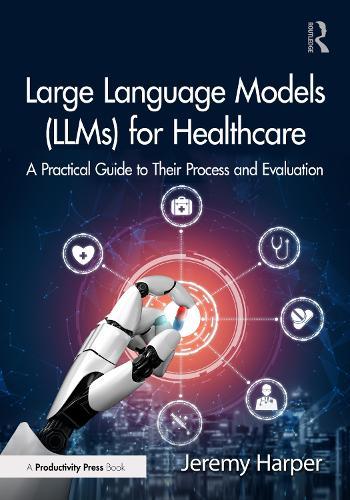Overview
In today’s rapidly evolving healthcare environment, one technology stands at the forefront of innovation: large language models (LLMs). Far more than a fleeting hype, LLMs represent a foundational shift in how healthcare professionals interact with and derive value from data. From simplifying clinical note-writing to supporting patient engagement and enhancing administrative processes, LLMs have the power to transform nearly every corner of the healthcare ecosystem. In Large Language Models (LLMs) for Healthcare, Jeremy Harper shines a spotlight on this transformative potential. With clarity and practicality, he explores how these advanced artificial intelligence (AI) tools can reshape clinical workflows, optimize administrative tasks, and ultimately create a more responsive, patient-centered model of care. Over the course of this book, you will discover new opportunities—learn how LLMs can reduce manual documentation burdens, provide intelligent summaries of complex patient histories, and offer real-time translations of clinical jargon; understand the fundamentals—grasp what LLMs are, how they work, and why they can handle vast amounts of clinical text more effectively than previous AI tools; examine key use cases—from automated billing support and smart note generation to patient triage and ethical telehealth consultations; address risks and realities—gain insight into challenges such as ""hallucinations,"" inherent bias, and the critical importance of patient privacy; plan for implementation—explore strategies for prompt engineering, fine-tuning, and rigorous evaluation of LLM solutions; and envision the future – glimpse how LLMs might revolutionize healthcare through enhanced back-office operations and cutting-edge clinical decision support.
Full Product Details
Author: Jeremy Harper
Publisher: Taylor & Francis Ltd
Imprint: Productivity Press
Weight: 0.453kg
ISBN: 9781032887289
ISBN 10: 1032887281
Pages: 10
Publication Date: 22 July 2025
Audience:
Professional and scholarly
,
College/higher education
,
Professional & Vocational
,
Postgraduate, Research & Scholarly
Format: Paperback
Publisher's Status: Forthcoming
Availability: Not yet available

This item is yet to be released. You can pre-order this item and we will dispatch it to you upon its release.
Author Information
Jeremy Harper is President of Owl Health Works, a consulting firm providing quality management, health informatics, and business services for their clients. He has 20 years of healthcare industry experience including academic medical centers, community hospitals, and software vendors. As an executive, his responsibilities have included planning, implementation, and management of deployments and enterprise-enhancing initiatives. He is an authority for best practices in artificial intelligence/machine learning, business strategy, data management, transformations, turnarounds, and organization growth strategies.




